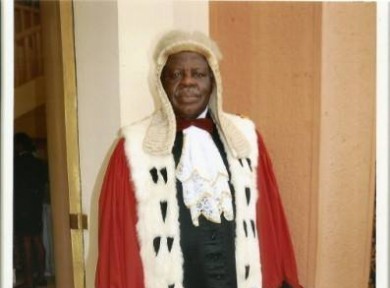The present revision and adoption of the Cameroon Penal Code by members of Parliament has been creating a lot of nuances. Common Law Lawyers on Thursday, 23rd June 2016 protested in Bamenda, calling on the government to withdraw the law especially the provisions which criminalised tenants for failing to pay up to 2 months rents. Also, there has been talks from different media sources that the new Penal Code which has been forwarded to the Senate contains provision in article 127 which gives immunity to members of Government. Chief Justice Ayah Paul Abine, Advocate General at the supreme court has allays those fears and defended the provision. On his Facebook page, he gave a clear explantion and said such a news is not only fallacious but it is misconstrued. He wrote:
I have finally procured an incomplete copy of the bill relative to the penal code. By a stroke of luck, the much talked-about Section 127 said to be conferring immunity on a member of government is available. I would imagine that the contention cannot be better appreciated than quoting in extenso the said section as it has ever been over the decades, and as it is now.
The penal code as enacted in 1967 provided:
“Section – By Judiciary on Particular Immunities
Any judicial, legal or investigating police officer who contrary to any law conferring immunity prosecutes, arrests or tries a member of the federal or a federated government, or of the federal or federated assembly, shall be punished with imprisonment for from one to five years.”
The bill currently before parliament provides:
“Section 127: By Judiciary or Particular Immunities
Any judicial, legal or investigating police officer who in violation of any law conferring immunity prosecutes, arrests or tries a member of the government or of parliament, shall be punished with imprisonment for from 1 (one) to 5 (five) years.”
In all honesty, the intention of parliament today is not at variance in any way with the intention of parliament in 1967. Any difference in the wording of the section previously and in the wording today is wholly peripheral, and such difference is surely dictated by the abolition of the federation which has rendered the phrases “federal and federated” inappropriate and even offensive today. In other words, Cameroon now has a single government and one parliament: we can logically talk about “a member of government or of parliament” rather that “a member of the federal or a federated government, or of the federal or federated assembly”.
I would like to be categorical that it is a false alarm to assert that the bill currently before parliament confers immunity on members of government. Everyone with a reasonable command of the English language would not contend that the bill merely does provide that, where any law may confer immunity on “a member of government”, inter alia, any judicial, legal or investigating police officer who conducts themselves contrary to the law so conferring immunity shall be punished…
Much as there are sections of the bill we can make issue with, or even take exception to, the claim that the bill confers immunity on members of government is wholly fallacious or misconstrued.
God is still saying something.






1 comment
bara I want to believe that the change from a federal republic to la republic and the consequent adjustsment in the law section dealing with the judgement and trail of government officials is a big manipulation by the Biya regime to completely nail this country and render it lawless.i agree the chief judge Ayah paul has some amount of positive views in his writeup on this issue but it all boils down to a matter of language.what does the French trsnslation of the law say?cameroonians should not be blind to let this happen or else we will keep giving this government the right to treat us like strangers in our homeland.